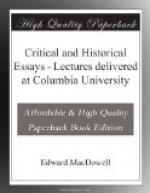Haendel’s strength lay in his great ability to produce overwhelming effects by comparatively simple means. This is especially the case in his great choruses which are massive in effect and yet simple to the verge of barrenness. This, of course, has no reference to the absurd fioriture and long passage work given to the voices,—an Italian fashion of the times,—but to the contrapuntal texture of the work. Of his oratorios, “The Messiah” is the best known. Two of his “Concerti Grossi,” the third and sixth, are sometimes played by string orchestras. Of his harpsichord music we have the eight “Suites” of 1720 (among which the one in E is known as having the variations called “The Harmonious Blacksmith"), and a number of “Harpsichord Lessons,” among which are six fugues. All these may be said to have little value.
J.S. Bach differed in almost every respect from Haendel, except that he was born in the same year and was killed by the same doctor. While Haendel left no pupils, with perhaps the exception of his assistant organist, Bach aided and taught his own celebrated sons, Krebs, Agricola, Kittel, Kirnberger, Marpurg, and many other distinguished musicians. Bach twice made an effort to see Haendel at Halle, but without success. On the other hand, there are reasons for believing that Haendel never took the trouble to examine any of Bach’s clavichord music. He lived like a conqueror in a foreign land, writing operas, oratorios, and concertos to order, and stealing ideas right and left without compunction; whereas Bach wrote from conviction, and no charge of plagiarism was ever laid at his door. Haendel left a great fortune of twenty thousand pounds. Bach’s small salary at the St. Thomas Church in Leipzig made it necessary for him to do much of his own engraving; and at his death, though he had helped many young struggling artists, his widow was left so poor that she had to be supported by public benevolence. Bach’s works were neglected by his contemporaries, and it was only in the nineteenth century that he began to be appreciated in a way commensurate with his worth.
Bach was born in Eisenach, in Thuringia, and it is of interest to know that as far back as his great grandfather, Veit Bach (born about 1550), music had been the profession of the family. Bach’s parents died when he was a boy of ten, and his education was continued by his elder brother, Johann Christoph, at a town near Gotha, where he held a position as organist. The boy soon outstripped his brother in learning, and continued his studies wholly by himself.




